- Home
- Aaron Allston
Solo Command Page 9
Solo Command Read online
Page 9
"Ail right... Wes?"
The baby-faced lieutenant took a final sip of his caf and grimaced. "Cold. Um, it has to do with privacy and defensibility. Northwest Two and East Thirty-One have advantages that way. The loading-dock areas are down recessed alley accesses that can be closed, remotely or directly, by gates. Both have roof access for flying vehicles but mesh screens can be dragged across them, as well, to limit access. The alleys don't have doors or viewports, so the traffic down them can be private."
"Right. Shalla?"
She waved toward the east facing of the complex, which was around the corner to their right. "East Thirty-One had some vehicle traffic when we were looking at it. Really expensive landspeeder with reflective viewports. One of them was large enough to put a swimming tank in. I think that's the private entrance for corporate executives, board members, and so on. The really wealthy. Also, East Thirty-One opens onto one of the busy thoroughfares, while Northwest Two opens onto a back street with nothing but warehouse buildings facing it. Like Wes said, privacy issues."
"That makes sense. Tyria?"
She didn't meet his gaze. "I just know it." She seemed huddled in her chair. Kell reached over to take her hand, but she barely acknowledged him.
Face said, "That's not good enough, Tyria. What do you know? How do you know it?"
She shook her head hard, sending her blond ponytail flip- , ping across the features of Donos beside her, and finally looked at Face directly. "I felt it. When we cruised past. There's something there. A residue of... pain. Of things so badly hurt that they desperately wanted to die. Not test animals, either. There was awareness there."
Face suppressed a shudder.
Kell said, "You felt something from the Force."
Tyria nodded. "I've been working so hard, to learn to re lax into it, not to push at it ... not to force the Force, as it were. Sometimes, now, I can put myself into a flow state where I'm almost not myself. I'm just reacting to what I'm feeling. I'd managed to do that when we cruised past. I almost wish I hadn't. I almost lost my last meal."
"Well, that's a good thing," Kell said. When Tyria looked at him, confused, he amended, "Not the throwing-up part. The flow-state part. That sounds like an improvement."
She managed a faint smile for him.
"Northwest Two," Face said. "That's our best entry."
"No," Lara said.
Face held up a hand. "Wait a second. Next to Northwest Two. Northwest One or Three. Where the security is likely to be less substantial."
"Yes," Lara said.
Face sagged in relief. "She said yes," he said. "You have no idea how long I've been waiting to hear her say yes."
Donos murmured something under his breath and Lara flushed red.
Under cover of darkness, they emerged from beneath the sheet ing covering the speeder's cargo bed. The speeder was parked between refuse containers in the parking area of a warehouse; across the thoroughfare was Binring's northwestern quadrant. This was the last the Wraiths would see of the speeder; at some point during the day its loss, and the disappearance of its owner, had to have been reported, and there was too much danger in piloting it around avenues of Lurark left almost deserted at night fall. They'd acquire other transportation for their departure from the city.
Shalla, kneeling in the shadow of one of the refuse con tainers, scanned the empty street and darkened Binring buildings below through a set of holorecording macrobinoculars. "Downward-facing holocams with overlapping coverage," she said. "Standard placement. For Imperial forces, that is. Overkill for a pharmaceutical-fabrications plant. Wait a second."
Face knelt beside her. The second turned into several, then finally she spoke. "There's a gap in the coverage. The most northern holocam on the western wall is positioned so it can't really see around the corner. The most western holocam on the northern wall isn't far enough west to make up the gap ... I don't think." She lowered the goggles and brought out a glow rod so she could look at the hand-drawn map they'd assembled that afternoon. "That's right. If we come in from the north, along this narrow approach, the holocams can't pick us up."
"It's a lie," Tyria said. Her voice was a whisper, a sad whisper.
Shalla shot her a look. "What do you mean?"
Tyria started as if out of some reverie and gave her a ner vous smile. "I'm sorry, I didn't mean it that way. It's not your lie, Shalla. It's theirs." Her wave indicated the Binring building. "There's a big . . . watchfulness over there waiting for us. It's laughing."
Shalla said, "You're getting weird, Tyria."
"Yes, but let's take her at her word," Face said. "Shalla, could they have set up the mistake in coverage deliberately, as a lure?"
"Yes."
"What would they be doing?"
"They'd have a secondary set of holocams in a less- obvious place." She brought up the macrobinoculars again. "I'd put them in those overhanging spotlights. There'd be no way to see them without getting right up to them ... and turning the lights out, of course."
There was a whine of machinery behind them and their stolen speeder moved off into the avenue, Donos at the controls. His job was to pilot it some distance away, acquire another one, and return, then set himself up in a position to snipe if the Wraiths experienced pursuit when they departed. Face noted Lara staring after Donos long after the speeder was gone and wondered what was going on between them. Something cheerful, he hoped.
"All right," Face said. "We're going in by the high road."
Minutes later, the entire crew of black-clad Wraiths stood atop the near warehouse, one that was, mercifully, far less thor oughly defended than their target. It was also one story taller than the Binring building, which would work in their favor.
Kell spent a few minutes mounting a device at the edge of the roof. It looked something like a small projectile cannon on a swivel mount, but the repulsorlift-based clamping system at the base of the mount was like nothing seen on a normal cannon. "This had better work," Kell murmured.
"It'll work," Shalla said.
"How do you know?"
"My sister and I had one when we were little girls. They're very reliable. Proven technology."
"You and your sister come from an odd family, Shalla."
She smiled at him, teeth gleaming. "Don't be jealous."
Kell made a final adjustment to the weapon and peered through its scope. "Ready, Captain."
Face said, "Numbers only from now on, people. Five, fire at will."
Kell slowly squeezed the trigger. The device made a noise like a protracted sneeze and launched a missile across the street; the missile dragged a length of black fibra-rope behind it. There was the faintest sound of a metallic clank atop the Binring building; then a motor started up in the gun and drew the fibra- rope taut.
Shalla clipped two devices to the cable: sleeve housings with handlebars hanging from them. "Crawler ready to go."
"Go. Ten, cover her."
Janson drew his blaster pistol and aimed in at the far roof. For most people this would be considered a tricky shot with a pistol—thirty-five or more meters in darkness. But the other Wraiths knew Janson to be an expert pistol shot.
Shalla carefully gripped the handlebars of the lead crawler device and swung herself out over empty space. Nimbly, she brought her legs up so her knees were over the bars of the second device. Then she thumbed a control on the handles she gripped ... and the crawler sped out along the fibra-rope, carrying her to the roof of the far building. A moment later, the two devices came back, the hand device pushing the knee device before it.
One after another, they took the crawler across, each Wraith settling in a crouch on the far roof. By the time Face ar rived, halfway through the pack of Wraiths, Lara, Shalla, and Kell had already examined their surroundings for accesses and other sensors.
And found some. "Standard roof hatches at intervals,"
Kell said. "And infrared beams just over there." He pointed. "On the roof over
Northwest Two."
"I find myself shocked," Face said. "No, really."
"We'll need to leave L—Two—one of the sets of infra-goggles so she can get through the beams."
"Give her yours. We'll rely on Four and her set when we're in."
Once they were assembled, Face directed Kell to disable security on the nearest roof access adjacent to Northwest Two. Within moments he had bypassed the basic security system there. Tyria led the descent down an access ladder, Face and Shalla close behind her.
And that was already a problem. Ever since Tyria had in dicated that her fleeting control over the Force had given her some insight into what went on at Binring, Face knew he had to put her on the intrusion team. But she'd originally been assigned to planting tracers on the roof. Face had switched her duties with Lara's. But that cost the intrusion team some of its technical proficiency, Lara being more mechanically adept than Tyria. Kell, their demolitions expert, and Shalla, their intelligence expert, now had to share much of the security work Lara would have been handling.
The change also cost them some faith in their tracer team. Tyria was an old enough hand to have managed her temporary partner, Elassar, but Lara's abilities to handle an unknown quantity like the new pilot were unproven.
Face shrugged. It was done, it would do him no good to worry.
Lara placed the fourth transmitter-marker against the knee- high barrier that served as inadequate warning to people that they should not go over the edge and fall off the roof. She acti vated it and watched it run through its self-test. Then she pulled back away from it in a crouch, making it more difficult for people at street level to see her.
Elassar was already four meters back from the edge, seated, popping something that looked suspiciously like candy into his mouth. "All done?" he asked.
"Not quite. I'm going to take a holo of the rooftop and surrounding area, then show on it where the markers are and transmit that to the Rogues. That'll give them a visual reference to go with their sensor readings. Why don't you make yourself useful? Or is that unlucky?"
He smiled at her, showing his fangs. "Not unlucky. I've done everything I can for this mission in the field of luck. I've cast all the charms I could manage, and unlike the rest of you, I've refrained from doing anything unlucky. And I've made myself useful, too. I found something out."
Lara readied her holocam, held it steady before her eye, and began a slow, careful 360-degree turn. Once this special surveyor's holocam caught the panoramic image she wanted, she would be able to mark points on the image and type in numeric values related to their relative altitude and distance from one another. Then the gadget's internal computer would generate a proportionally correct image that any navigational computer, such as an astromech, could look at from any relative altitude. "What did you find out?"
"Well, that whole network of infrared beams over Northwest Two. I looked at it through your infra-goggles. The posts that the beams are coming out of are years old. They're well kept-up, but there's corrosion on them, and I can see where one of the posts has had to be straightened and realigned when it was knocked over or something."
"So?" Lara finished her turn and knelt with the holocam. On its built-in screen, she brought up the image she'd just taken. She slid a stylus from the side of the device and began marking her reference points.
"So the roof surface over there is brand-new. It's not brand- new here or on any of the places we've been walking, but it's brand-new there."
Lara looked up, suddenly disturbed. "Show me."
There was no marker to indicate the border between North west Two and Northwest Three, but they stopped a meter short of the first post that they knew held the infrared devices. Elas sar knelt and Lara followed suit.
"See, here," Elassar said. He stretched a finger up almost to the point protected by the infrared. "A seam."
Lara couldn't see, so she risked a moment's illumination with her glow rod. Elassar was right: there was a score, straight as a laser beam, running along the roof between the two building sections. It was so thin as to be nearly invisible even in good light.
She switched the rod off. "So the roof material was laid down in sections. It looks just the same as the roof here."
"Yes, it does. It has been walked on and scuffed a lot, just like the roofing here. But it smells different. Much sharper. It's new."
Lara sighed. This had to be some new-pilot prank. But, obligingly, she leaned back and sniffed at the roofing they'd been walking on. It smelled faintly of industrial chemicals. Then she leaned forward and sniffed again at the other section.
The smell was stronger, crisper.
From her wrist sheath she pulled her vibroblade. She did not power it on. She dug at the seam between the two roof sections, prying the new section up. It was a gummy mass perhaps two centimeters deep and resisted her efforts, but finally she was able to turn up a flap of the material. Elassar obligingly pulled at the edge until half a square meter or so was revealed.
The underside of the material was thick with tiny circular devices made of shiny metal. They were spaced at about eight-centimeter intervals and connected by thin silvery wires. "Pressure sensors," she said.
"Not a problem," said Elassar. "None of us walked on them. And we didn't apply pressure to pull them up."
"That's not the point. They've added a layer of security under the substantial security already in place, and it's a differ ent type. If they've done that throughout the complex, the Wraiths might be dismantling one layer but not the new stuff."
"So give them a call."
"Which will probably give our presence away." She sighed and looked over the boulevard at the rooftop where Donos was. She couldn't see him, but she'd heard his return with a new speeder a few minutes before. It was so hard, working with people; on her missions for Imperial Intelligence, she'd al ways been alone. No one else to be responsible for.
She brought up her comlink and thumbed on its scrambler mode. "Two to Six. Do not acknowledge. Additional security on roof suggests this site is prepared for your arrival. Check for new modifications to your surroundings. Two out." She grabbed up her holocam and rose. "Let's move out."
"Comm signal," a technician said. His voice was unnaturally shrill.
Dr. Gast blinked and looked around. She'd actually fallen asleep. Boredom and lack of any decent occupation will do that to you, she thought, her voice cranky even when expressed only in her own mind.
The control room was antiseptically white, except where the floor and walls were marked by black marks and scores resulting from the haste with which some of this equipment had been assembled. The four walls were occupied by banks of terminals, each dedicated to a different area of coverage or function. Six per wall, twenty-four in all, occupied every hour of the day, and never anything to report except the occasional repairman working on an adjacent roof section or an avian landing on the roof of the protected zone.
Until now, maybe.
Gast's own console was a nearly complete circle of termi nals and controls, her chair in the center. She lazily swiveled until she could look at the back of the technician who'd spoken. "Let's hear it," she said.
"It's encrypted, Doctor."
"Decrypt it. Where's it coming from?"
"I have that." Another technician's voice. He didn't bother to wait for permission; he patched through his holocam view to one of Gast's terminals. She liked that. Initiative. Which one was this? It was Drufeys, the lean one with the lazy eye.
The holocam was an infrared unit., It was a static view of the roof, and showed two blurry red figures, one male and one female, creeping along the roof.
Away from the protected zone. Gast frowned. That was disappointing. Had they recognized the first line of security and decided to run away?
She turned to the console where her new intelligence specialist, a man on loan from Warlord Zsinj, sat. "Captain Netbers, what are they doing?"
Netbers rose an
d approached her. He was a huge man, easily two meters tall, with a musculature that suggested he spent more time improving it than he did sleeping. A pity he was so ugly— obviously a fighter, he looked as though he had fallen asleep in an automatic door and it had slammed shut on his face for an afternoon. But the eyes underneath his shaggy brown hair were dark and intelligent. When he spoke, his voice was deep and raspy. "They've seen the security perimeter."
"And it scared them off?"
He smiled. His teeth were regular. She somehow doubted they were original equipment. "No," he said. "That comm transmission was them informing the other members of their team. They're getting clear in case we caught the signal."

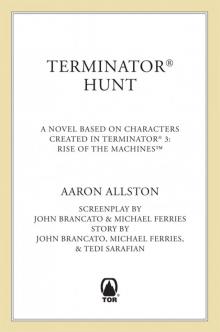 Terminator 3--Terminator Hunt
Terminator 3--Terminator Hunt Mercy Kil
Mercy Kil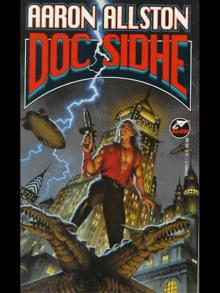 Doc Sidhe
Doc Sidhe Star Wars: Fate of the Jedi: Outcast
Star Wars: Fate of the Jedi: Outcast Fate of the Jedi: Backlash
Fate of the Jedi: Backlash Mercy Kill
Mercy Kill Rebel Stand
Rebel Stand Wraith Squadron
Wraith Squadron Star Wars: X-Wing VII: Solo Command
Star Wars: X-Wing VII: Solo Command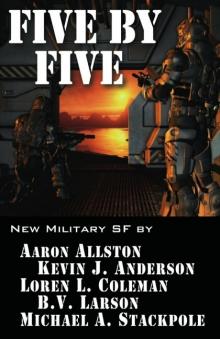 Five by Five
Five by Five Solo Command
Solo Command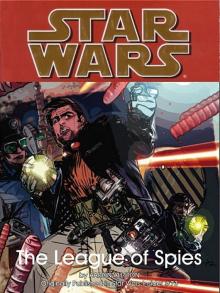 Star Wars: The Clone Wars Short Stories: The League of Spies
Star Wars: The Clone Wars Short Stories: The League of Spies Sidhe-Devil
Sidhe-Devil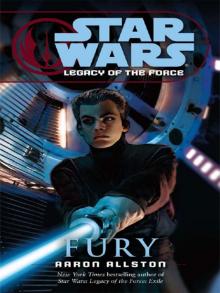 Star Wars: Legacy of the Force: Fury
Star Wars: Legacy of the Force: Fury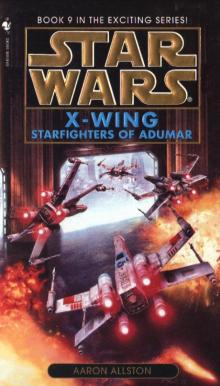 Starfighters of Adumar
Starfighters of Adumar Star Wars: X-Wing VI: Iron Fist
Star Wars: X-Wing VI: Iron Fist Star Wars - X-Wing - Iron Fist
Star Wars - X-Wing - Iron Fist Exile
Exile Star Wars: X-Wing V: Wraith Squadron
Star Wars: X-Wing V: Wraith Squadron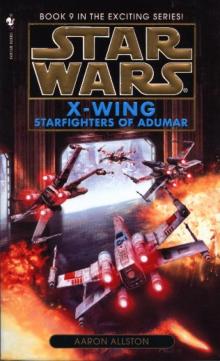 Star Wars - X-Wing - Starfighters of Adumar
Star Wars - X-Wing - Starfighters of Adumar Rebel Stand: Enemy Lines II
Rebel Stand: Enemy Lines II Rebel Dream: Enemy Lines I
Rebel Dream: Enemy Lines I Outcast
Outcast Star Wars - X-Wing 07 - Solo Command
Star Wars - X-Wing 07 - Solo Command